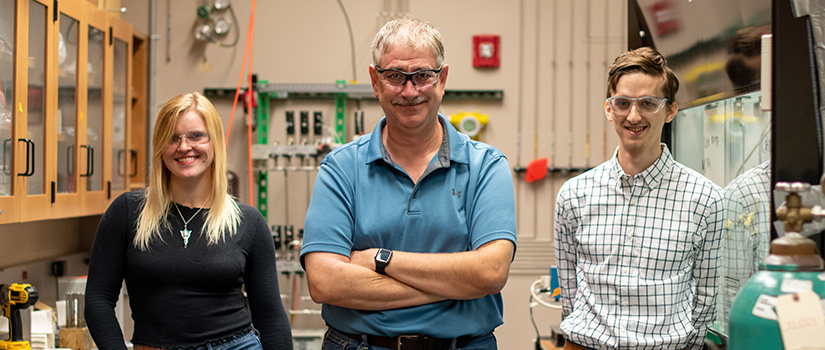By Abe Danaher | December 17, 2019
Using artificial intelligence and high-throughput screening, Jochen Lauterbach, a professor of chemical engineering and a Smartstate endowed chair, has identified and filed patents for three new ammonia decomposition catalysts in the past year. The reality is this: his patents reflect the most significant progress made researching this reaction in the past 30 years.
“If you go through the literature, people have looked at this reaction for almost 100 years and the last 30 years or so for practical fuel cell applications,” he says. “There’s been multiple review papers that basically all look at variations of the same catalyst and we found three really good materials that nobody has talked about."
Artificial intelligence allowed the group to explore catalysts and factors that have never been explored before by identifying trends at a speed that is not humanly possible. The AI also allows for materials discovery without the preconceived notions of past chemical engineering findings, leading Lauterbach’s group to try catalysts that were previously dismissed or never considered.
“It’s looking for patterns, that’s all it does really,” he says. “It’s looking for patterns and then tries to predict your next step, your next good material based on those connections and patterns that it makes.”
Artificial intelligence has been used on hypothetical, fundamental research in the field for the last couple of years. But, Lauterbach’s team is the first to pair it with true experimental lab data to produce a marketable product.
Inside the lab, fourth year doctoral student Katie McCullough and doctoral graduate Travis Williams collected experimental data for the team’s project. After gathering this first data set, they provided the findings to their self-built artificial intelligence, at which point it sifted through and identified the most important catalytic features. Then, the group tailored their next experiments based on the technology’s findings.
“It’s going to say, maybe, this combination of 30 features makes a really good catalyst,” McCullough says. “And that’s hard for us to do. We can say one or two variables are important, but we can’t say which 30 are going to be important. So, it takes those 30 and spits out what we should try next.”
This is radically different from standard research methods. Traditionally, Lauterbach explains, the belief has been that good scientists use their scientific knowledge to think first and then make decisions on which materials to explore. But, he says, by adopting an “Edisonian approach” and combining a diverse screening method with AI knowledge extraction, he believes to have created a template for future discovery.
“I think with standard scientific methods we are restricting ourselves severely,” he says. “I mean, we’ve gotten seven patents granted in the last four or five years. This is something that is definitely moving at a high pace.”
“It’s going to be the future of materials discovery,” he adds.
While some in the field may debate Lauterbach’s bold prediction, there is no questioning that he will continue using the method going forward. Lauterbach says that for future projects, if someone comes to him asking for a new catalyst, he will undoubtably employ artificial intelligence as his “bread and butter approach.”
Despite fears that this approach is taking the scientist out of the science, he believes that the rest of the field is realizing the discovery potential of this method. With the new findings that he knows will come from these methods, he foresees a wave of research emerging.
“Now, the science starts,” Lauterbach says. “We need to understand the fundamentals. Why do those materials perform the way they perform? I think these AI-based discoveries will open up new science.”
For more details on Lauterbach's research, read his published manuscript here!
